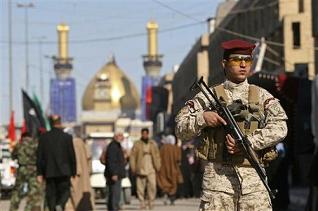Ahead of a landmark Arab summit next week, Iraqi authorities locked down on Wednesday key routes in the capital on Wednesday as al-Qaeda group claimed responsibility for the deadly attacks that killed dozens a day earlier.
Ahead of a landmark Arab summit next week, Iraqi authorities locked down on Wednesday key routes in the capital on Wednesday as al-Qaeda group claimed responsibility for the deadly attacks that killed dozens a day earlier.
Wednesday's heightened security measures worsened already choking traffic in Baghdad.
Journalists reported full or partial closures of key routes in the capital, while roads that remained open saw increased numbers of checkpoints and security forces, and virtually all of the bridges that traverse the Tigris were also shut.
The tightened measures came a day after nationwide gun and bomb attacks killed 50 people and left 255 others wounded.
In a statement posted on forum “Honein”, theso-called “Islamic State of Iraq” declared it was behind the attacks against several "official posts and security and military posts" in the country.
"The lions (jihadists) of Al-Sunna... of the Islamic State of Iraq simultaneously attacked the authorities' security plans... for the meeting of Arab tyrants in Baghdad," said the statement dated March 20.
These attacks "destroyed the plans of the head of Iraqi security chiefs in the space of a few hours," it added.
Tuesday's violence rocked 20 towns and cities spanning the northern oil hub of Kirkuk and the holy city of Karbala, south of Baghdad, from 7:00 am (0400 GMT), and continued through the day.
Following the attacks, the government declared a week of public holidays from March 25 to April 1.
Officials insist Iraq's forces are capable of maintaining security for the summit, and have drafted in an additional 4,000-odd policemen and soldiers to do so, but admit they may need to effectively shut down Baghdad to do so.